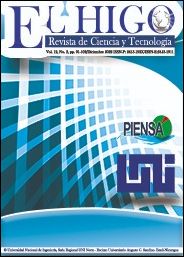Estado actual de las líneas de investigación del programa de Ingeniería Química de la Universidad Nacional de Ingeniería en Nicaragua, periodo del año 2010 al primer semestre del año 2022
DOI:
https://doi.org/10.5377/elhigo.v12i2.15195Palabras clave:
Líneas de investigación, Ingeniería Química, UNI, NicaraguaResumen
El objetivo de la presente investigación es presentar el estado actual de las líneas de investigación del programa de ingeniería química, realizado mediante la implementación de un diagnóstico considerando las tesis presentadas en el periodo de 2010 - primer semestre 2022 y una encuesta dirigida a los docentes. Las líneas de investigación son importantes en esta carrera debido a la naturaleza de su programa académico. Del diagnóstico se obtuvo para este periodo un 55.3 % correspondientes a investigación aplicada, de los cuales un 25.9 % fueron en calidad del agua, un 15.2% en materiales alternativos al cemento portland, seguida por un 14.1% en desarrollo de nuevos productos alimenticios. Con una menor representación se determinó un 6.1 % en Inocuidad de alimentos, 4% manejo de desechos sólidos y un 2% para biocombustible. Esto nos da un indicador del estado actual en que se encuentran las líneas.
Descargas
1000
Citas
Acta de Consejo de Facultad Número CF 10-2014, Facultad de Ingeniería Química, Universidad Nacional de Ingeniería, Nicaragua.
Áreas estratégicas de investigación, desarrollo e innovación de la Universidad Nacional de Ingeniería, aprobado por el Honorable Consejo Universitario en sesión extraordinaria Número 02-2014, Nicaragua.
Base de datos de trabajos monográficos, período 2010 – 1er semestre 2022, Secretaría Académica de la Facultad de Ingeniería Química (SAFIQ), Universidad Nacional de Ingeniería, Nicaragua.
Instructivo para la realización de trabajo de diploma en la Facultad de Ingeniería Química, revisado en Consejo de Facultad en el año 2010, Facultad de Ingeniería Química, Universidad Nacional de Ingeniería, Nicaragua.
Descargas
Publicado
Cómo citar
Número
Sección
Licencia
Derechos de autor 2022 Universidad Nacional de Ingeniería

Esta obra está bajo una licencia internacional Creative Commons Atribución-NoComercial-SinDerivadas 4.0.






